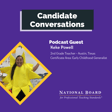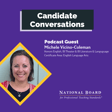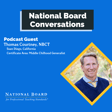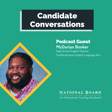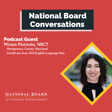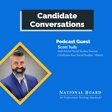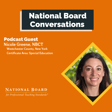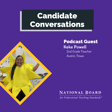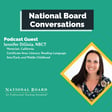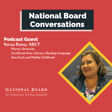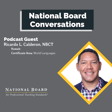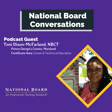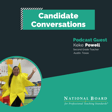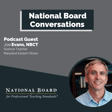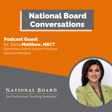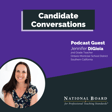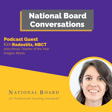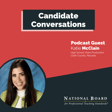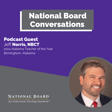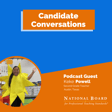Become a Creator today!Start creating today - Share your story with the world!
Start for free
00:00:00
00:00:01

Aaniin! Tan-A Hoffman on Indigenous Education, Language Revitalization, and the Power of National Board Certification
Join us for an inspiring conversation with Tan-A Hoffman, an Anishinaabe language and culture teacher from Michigan's Upper Peninsula. Tan-A shares her passion for Indigenous education, her journey to becoming a National Board Certified Teacher, and her advocacy for culturally responsive teaching.
In this episode, you'll hear about:
- The importance of Indigenous languages: Tan-A discusses the vital role language plays in Indigenous sovereignty and how schools can support language revitalization efforts.
- Bringing Indigenous knowledge to life: Discover how Tan-A incorporates land-based learning and traditional practices into her classroom, from processing manoomin (wild rice) to learning about treaty rights.
- The impact of National Board Certification: Tan-A reflects on her National Board journey and how it has opened doors for leadership and mentorship.
- Advice for culturally responsive teaching: Gain valuable insights on how to create a more inclusive and engaging learning environment for all students.
Plus, don't miss Tan-A's heartwarming story about learning from elders and her powerful message about the importance of representation in education. This episode is a must-listen for anyone who cares about creating a more equitable and just education system.
Transcript
Introduction of Tana Hoffman
00:00:00
Speaker
on in Welcome to National Board of Conversations, the podcast where we celebrate extraordinary educators who are making a difference in the lives of students. I'm your host, Edward Santiago, and today we have an incredible honor of speaking with Tana Hoffman. Tana is an Ashenave language and culture teacher from the Upper Peninsula of Michigan. She's a passionate advocate for Indigenous education, a National Board-certified teacher, and a board member of the National Board for Professional Teaching Standards. Teaching is really a passion. It's a passion project and it has to come from your heart. Tana's dedication to her students and community shines through in everything she does. From revitalizing Anishinaabe Mowen in her classroom to promoting equitable change in education. She's a true inspiration. so let not So don't let me hold you any longer. Here's my conversation with Tana.
Cultural Significance of Geography
00:00:54
Speaker
ternna hoffman Thank you for joining me on the podcast. I'm excited to have you. It's Indigenous Peoples Month, and we're going to get into it. You're a very strong advocate for Indigenous people. You're Indigenous yourself. I'm not going to try to pronounce your tribe because I might embarrass myself. I'll let you do it first and then go from there. How are you doing today?
00:01:09
Speaker
Lovely. Thank you so much for having me. This is very exciting. Yeah, so Ani Bojo, Tana Hoffman, Indiznikas, Wabashka Makunz, Indigu, Makwa Indodum, Bawating, Indah, and I am from the Little Traverse Bay Band of Odawa Indians. We call it Waganakusing. That is our original name. So,
00:01:33
Speaker
where the tree bends. That's how people knew um coming down ah Lake Michigan, where to stop and find us. We had a tree that was known to have a little crook in it. And so, yeah. That is actually a really cool little story. Like I'm somebody who like does geography by landmarks too. So I love i love that that it's an abandoned jury.
Personal Favorites and Influences
00:01:57
Speaker
All right, so can you give us a brief intro yourself, your current role, and where are you at? Sure. So I am a, it's, so it's in the Anishinaabe name, but otherwise I am the Culture Coordinator and Middle School Language Teacher, Culture and Language Teacher. So that is
00:02:19
Speaker
So that's Anishinaabe Chitotihuahuan, the things that we do and who we are culturally, as well as the Anishinaabe Moen, which is the language teacher. Oh, man, that's amazing. So we're going to get into a little bit of you personally. So what are your three favorite foods? OK, so ah carrot cake for sure. I'm all about cake. I love cake.
00:02:42
Speaker
yeah What's up? You got a recipe for carrot cake? No, I don't make it. I just eat it. Crazy. So chicken slavaki, strange, um but I grew up in Grand Rapids, Michigan. And in June, there's this huge festival and everybody comes out and it's super inclusive. And I just have memories of, you know, getting my chicken slavaki on a stick and eating that as we go around festival.
00:03:12
Speaker
And then ah one last thing that I always get, this is my Dairy Queen order. I must say it is the ah Hawaiian Blizzard with twist ice cream because I got to have a little chocolate and I got to have chopped nuts. So it's kind of like a banana split, but it's a Blizzard. That sounds interesting. That sounds really interesting.
00:03:38
Speaker
OK, I see where you're going there. The twi ice cream is perfect because it like it definitely gives a little extra extra bite. That's right. So what are three songs that shaped you? um So.
00:03:51
Speaker
I can't think of three, but I'm a little embarrassed to admit this one. um I was born in the 70s. I'm a child of the 80s and in the 90s, you know, that's like our jam, right? Yeah, So whenever I feel really down or I'm over perseverating on something, um you know, something that I don't want to take up that mental space anymore. I sing the Renan Stimpy song. I don't know if you're familiar with this. it's Oh, very. I feel like Renan Stimpy kind of went off the air while I was like coming of age, like when I was like eight or nine. Like I definitely remember Renan Stimpy. That was my guys. Okay, so Happy Happy Joy Joy. Yeah. Yeah, that's, I am i mean,
00:04:41
Speaker
exclude the visual that goes with that with Ren and Stimpy, because it's kind of suspect. But um that is that is my song. So whenever I need a little lift enough, that's where I go. And it's kind of funny, because I talked to the kids about it and how um the things that we do or think about can change our attitude and change our minds. And I share that with them all the time. And they're clueless, right on who Ren and Stimpy is. And so when I show them a video, they're like, Mrs. Hoffman, this is not okay. This is what she was watching? What is wrong? Sorry. I know. yeah Hey, no reason to be embarrassed and racist.
00:05:21
Speaker
All right, so the one team, one sports team that has your heart, and if you're not really a sports fan, movies, you can recite Lion for Lion.
Sports and Science Inspirations
00:05:28
Speaker
Okay, so you cannot be a Michigander and not root for the Lions. They're killing it yeah are they coming in right now. Right? We are now in our time. We have been fans, we are die-hard fans. If you are a Lions fan, you know you have been through the ringer. um And so we are loving every minute of this right now.
00:05:51
Speaker
hey Listen enjoy it's it's fun being on time. It's fun winning right and I've been down for so long All right, so you guys a movie you can recite line for line Okay, so as an elementary school kid, I um saw this movie called Space Camp.
Path to Education Career
00:06:18
Speaker
It was made in the late 80s. And it really made me wanted to go into science and actually made me want to be an astronaut.
00:06:29
Speaker
um Vision isn't so good. Found out later. I'm not really liking them so much. I'm more of an ELA kind of gal. um And ah yeah, so that one, excuse me, I love it. Whitney beat me. Take away my charge card. NASA's talking. Oh, man. I'm sorry. We love it. We love it. I'm quite the quirky person, as you can tell. I love it. I'll enjoy it. So what are some hobbies you have outside of being involved with your school and community?
00:07:00
Speaker
um I read. I don't watch a lot of TV anymore. I think my um attention is not able to like sit there and watch a 30-minute sitcom or even a two-hour movie. I just don't have it in me anymore. But give me a book and a full day to do nothing. I can sit there and read.
00:07:25
Speaker
ah So that's really what I'm doing these days. It also kind of goes with the idea that um I didn't read in school. Me neither. It's crazy. And I've read 13 books this year. Yeah, I was a writer in school. Reading was super hard. um I was actually considered a special education student within later diagnosed with dyslexia. um And so reading did not really come alive for me until about my junior year of high school. And since then, it's just exploded. So
00:07:58
Speaker
That's awesome. my It really is a whole new world when you get it when you've really connect with books. and It's really been awesome really get for me personally getting into reading this year. It's really cool. Beautiful. So can you share why you became an educator and remain in education?
00:08:11
Speaker
Yeah, so like I was saying before, um you know, i had some I had some needs in school, right? And so ah becoming the teacher that I needed was really important to me. And I didn't really see that path until I got about a couple of years into college already.
00:08:31
Speaker
um and was trying to think about where I was going to go and what I was going to do and you know I thought maybe I wanted to work with kids but um um you know psychology was just I think a little too heavy for me and then the social work was just too much on my heart And so, right, so I went into education and then just found um a true love in my true passion. um As Anishinaabeg, we are brought up and told that we have special gifts that are endowed, given to us by the Creator, and those gifts um are connected to our clans and our are connected to our Anishinaabe names.
00:09:13
Speaker
um They're connected to our ancestors. And so in finding that path and that passion, um I really do believe that um I'm my purpose. um' I'm living my purpose. so That's amazing. And ah we love it. So what was your national board journey like? And how has it changed your teaching approach, especially when sharing Anishinaabe culture and language?
National Board Certification Journey
00:09:39
Speaker
So funny thing is I started my journey as an as a reading recovery teacher. So I spent, yeah, so strangely enough, i um my my teaching history, as you say, um I started as a fourth grade teacher and I spent about eight years teaching fourth grade. And then I switched schools and became a reading specialist.
00:10:05
Speaker
i It wasn't really until I went through reading recovery training as a teacher that I truly blossomed, I think, as a reader and ah and understanding that acquisition of literacy um right from the beginning. um So it was a really beautiful, like, self fulfilling kind of journey for me in that. um And then I got to the point where I was just like, well, I've got my master's and do I want to get, you know, maybe an education specialist in literacy or do I want to get a doctorate in literacy? And um I had and was very blessed to have an opportunity. the um
00:10:47
Speaker
ah Obama i decided to work together along with our Department of Indian Education in the Department of Indian Affairs and created a situation where they decided they wanted over a thousand Native American teachers working on reservations to become nationally board certified and they funded it.
00:11:08
Speaker
Man, that's amazing. So, you know, I i i was given um a mentor a in Wisconsin in 10 hours away, but still. Yeah, we were given a mentor. um We were given um incentives to complete the task, to complete our components, as well as paid for our components. And so,
00:11:34
Speaker
It just happened to be the perfect opportunity. And so I went ahead and decided to do that. I ended up leaving reading recovery um and going to fourth back to fourth grade, but in this new school because we were coming up against a time where Michigan was now creating a third grade reading law. And we really needed to kind of beef up ah the literacy instruction in the upper elementary. And so um I wanted to really kind of dig in and do the kind of hard work that was necessary to help um fourth grade students but also um young teachers that may not have as much maybe experience with students of that age as well as acquisition of literacy because I remember
00:12:23
Speaker
um teaching fourth grade in my first eight years. And I was like, I doing. I mean, college didn't prepare me for this. And all I could read was the teacher's manuals and try to figure it out. um And at that time, shh, we didn't have the internet. So I got to Google this one. What was the role before the internet? I don't know. So that was really an amazing opportunity. And ah we now have Oh goodness, 10 nationally board certified teachers at my school and um through the years have had roughly up to at times 25 people going through candidacy. And so that's been pretty amazing. Although the Bureau of Indian Education incentive is no longer at our school, our the tribe that we are in community with,
00:13:17
Speaker
um the Sault Ste. Marie tribe of Chippewa Indians, they have decided that this is important to them. And so they continue to fund, um right, our national board journeys and candidacy for teachers that want to go ahead and go through that. So it's amazing. Pretty cool. That's really, really cool. Yeah, very lucky. So how does national board certification opened up new opportunities for leadership or mentorship within your school district state? It seems like you've been all over the place.
00:13:48
Speaker
I don't know about that but you know um it really did and it started out so I um I think I achieved in 1918 or 19 and during that time met with uh Dr. Holmes Sutton and Juliana and all the superstars I know that's what an amazing mentors they could be and so yeah we actually work together um right at the start to create opportunities for minority teachers to go ahead and create ah a space where we could get together and talk about our issues with our leaders and our instructional individuals that means specific
00:14:32
Speaker
um things to diverse groups of people and so for for black and brown students, right? um And so that was really important to us. So yeah having mentors like that is is an amazing advantage there. come But then um after becoming a National Board of Professional Teaching Standards board member, I then um was a what am I thinking, um asked to apply for Michigan Teacher of the Year. And so I went through that process with the state of Michigan and I became the 2020 regional teacher of the year. So in Michigan where we have um several regions and the upper peninsula is region one. And so yeah, that year I was a region one teacher of the year. So that was pretty fantastic.
00:15:25
Speaker
i And so I think those two pieces together nationally board certified teacher regional teacher of the year um It helps give me a seat at tables that um indigenous individuals Don't usually have a seat at and so um I'm pretty pretty proud of that and I try to be very cognizant of that um so that I can bring my perspective of the the things that we have endured and why things may be difficult but yeah also the beauties of who we are to the table in conversations. Oh man no it's it's good to see uh highly qualified teachers experiencing the leadership opportunities and being able to have those conversations about what's impacting classrooms right because sometimes people have conversations over
00:16:14
Speaker
teachers and they without them being in the room. And it's yeah about us, not with us. Right. Yeah. Yeah. Yeah. And I also think it's really important that um like I keep my national board certification um paperwork right up in my classroom because I want others, other Native American children, of course, um to see that this is possible and that there are more things out there. And, you know, it's the windows and doors. Right.
00:16:44
Speaker
All the ones you gotta, sometimes you gotta open them yourself. and yeah Absolutely, that's right. And show them what's possible. So yeah, represent representation matters. um Whether it's in the classroom or whether it's at the table, helping make decisions. um And so I try to do that.
Integrating Indigenous Knowledge
00:17:02
Speaker
So yeah, November's Indigenous Peoples Month, but you bring in indigenous knowledge and perspective into your classroom room all year round.
00:17:08
Speaker
How do you do that? And what kind of impact does it have on your students? Oh my goodness. So, um, outrageous, right? There's a lot of pieces to that, especially when I was a general education teacher. So, you know, this is once again, a reason, reason why, um, representation matters because I don't have to think more about adding that cultural ah diversity into my lessons. I can speak from my heart and speak from what I know as I'm teaching the subjects that I teach ah in order to share that indigenous knowledge with my students.
00:17:48
Speaker
um But now that I'm in a position of Culture Coordinator, and it is absolutely phenomenal some of the things that we're doing. I get to have a class, an elective class, where that's all we do. It's 100% land-based, place-based education. So um last year we brought over some community knowledge keepers that understood how to process monomen. So monomen is a very um special and sacred food to Anishinaabek. It's called the good berry and that's what monomen means, the good berry.
00:18:26
Speaker
So it's connected to our journey, our Anishinaabeg journey. So our story starts actually on the eastern coast um at the ocean. hey ah And then our prophecies and prophets guided us all the way over here looking for food that grows on the water. And it's this manoomin. And so creating that opportunity because Unfortunately, due to over harvesting, due to the destruction of places that have happened, things that that have happened in the water and the Great Lakes, um we don't have Minomen beds anymore. Correct. And so in order to get that Minomen, we have to go to Wisconsin or Minnesota.
00:19:10
Speaker
um and bring it back. And right now, different tribal um groups are working hard to reestablish those minimum beds. But this is something that we have lost as ah as a people, that activity of doing that. And so having the kids come back and be able to do that here at our school and learn about that um building traditional giman or traditional birch bark canoes that go along with that. And then um rice knockers, those are the poles that we use to take the rice off of the actual stalks when they're in the water. um So quite a amazing stuff. We had another um elder come in and teach us about
00:19:54
Speaker
um hiding a deer. So we had a deer strung up in our garage and the kids were able then to not only try to um try to take the flesh, flushing the hide, taking the hair off the hide.
00:20:11
Speaker
um All while using brain tanning methods are traditional methods. So we had to get the brain out of the deer i Yes, and do all of it, but then also learning about the importance of Wawashkeshi which is deer and Ojibwe um in understanding um the different instructions that were given to us by the creator. So when um a kih or earth was made, um everything we believed had a spirit in it. And so the earth has a spirit, the wind has a spirit, but then on top of it, um the earth or um the creator put down um the plant beans and told the plant beans, your job
00:20:55
Speaker
is to take care of the two-legged and the four-legged or take care of the spirits that are yet to come. Creator then put down the four-legged. Your job is to take care of the spirits that are yet to come. The two-legged came down and your job is to take care of those spirits that are already here on Earth. And that's that stewardship connection then, right? But then they also get to learn what we say at Azucons, or those are the sacred stories that we only tell in the wintertime when snow is firmly on the ground, um which we didn't have a whole lot of time last year. I don't know about you, but our winter was a bit messed up.
00:21:33
Speaker
you So we had to hurry up and tell a bunch of winter stories and take that time to instill all of those teachings while we're trying to do all this really cool place-based knowledge.
00:21:49
Speaker
so yeah i mean we learn about um trapping. We learn about fishing. We learn about treaty rights. We learn about boarding schools. We learn about our history, not only from the journey from the East Coast over, but even our our current history. So lots of amazing things. It's crazy in here. Sounds fascinating. and I would love to just jump in your classroom first for a year. Oh, goodness. It's fun.
Language and Sovereignty
00:22:24
Speaker
Along with all that, it's important to keep indigenous language alive and thriving. What roles should schools play in that? And what are some things you've done in your own classroom that have worked well? So um there are three.
00:22:36
Speaker
very vital things that give us as indigenous people sovereignty. um And that means the ability to govern ourselves um and to make sure that we are still considered um what we would say as an entity or a nation inside a nation. So most people don't realize that that um treaties were made with indigenous or different tribal groups with the understanding that it was one nation to one nation. The United States only makes treaties with other nations and so we are, although we are now on reservations or in different land areas, those tribal communities with reservations have to be considered.
00:23:24
Speaker
um legally other nations, although we follow rules that are state rules and also federal rules. um But we get the ability to have sovereign control over some things. And in order to keep that sovereignty, you have to have land. This is what the federal government has decided for us, unfortunately. But you have to have land. um You have to have the ability to govern yourselves and you have to have your language.
00:23:56
Speaker
Unfortunately, there are too many and indigenous nations around the United States that are losing their language because of boarding schools because of federal Indian policy. And as they continue to learn or as they continue to lose their elders that carry that knowledge, um they're losing pieces and parts of ultimately who they are and then the sovereignty that then is given to them in this in the United States.
00:24:29
Speaker
So, with that, um language is an absolute must. um One of my teachers says that um above no fault of our own, we don't speak our language. ah And that is directly related to the federal Indian policy that has been put upon us and created by the federal government to distinguish or to actually extinguish us.
00:24:57
Speaker
um And so in that essence, I'm not supposed to be here. I am not supposed to be here. I'm not supposed to know who I am as Anishinaabe, Anishinaabe Kwe. I am not supposed to be learning my language, and we are not supposed to be teaching children this right here, right now, and especially as a Bureau of Indian Education School. So with that, we are ah very resilient in fighting those pieces, right?
00:25:26
Speaker
and so um How do we do that in the classroom. Well, I, I'm actually taking language class myself and then that is my role is to be the Anishinaabemowen Kitomage, the language teacher. But before that when I was just in the classroom, not just in the classroom but in a general education classroom.
00:25:47
Speaker
um One example is is that I was teaching ah the double consonant phonics idea about how the double consonant then rules the vowel in front of it, right? And we ended up ah calling it ah the Gitcha Gitcha Ganeshi Rule because the double consonant is an alert system for your eyes to see how that vowel before it is going to either be a long sound or a short sound, right?
00:26:17
Speaker
And so what do chickadees do when they see a predator? They let out these sounds. And it's just amazing. And they just keep going and keep going and getting louder and louder so that the predator thinks that they're a larger thing than what they are. And so every time the kids would see a double consonant in a word, they'd yell out and be that alert system for us. And so I'm not gonna lie, it did make some coral reading or some reading altogether a little difficult at times, but how can how can you get upset when they're, you know, number one, doing the academics of the phonics and and recognizing that, but then also speaking their language. So, you know. that world Listen, it's gonna be kids. That's right. Just
Advocacy and Education Policies
00:27:10
Speaker
get excited. and
00:27:11
Speaker
You're clearly passionate about educational leadership, especially when it comes to Native American education. know How does your work with the National Board, especially as a board member, help you make a difference in indigenous for Indigenous students? um Well, I am the only Native American that is sitting on a the board for the National Board. and so um I think it's super important that a although um unfortunately ah people have stereotypes of what Anishinaabeg look like, I do not meet those stereotypes. And at times people forget that. um And so it's really important for me to show who I am in other ways, whether it be with my earrings,
00:27:55
Speaker
or the ribbon skirts um that I wear but it's important for others especially when I'm in those board meetings to know what perspective I'm bringing to this table and it is not your typical um i I suppose, Caucasian perspective that it that matches right our school system. yeah got son you know We have so many teachers right now that don't match the actual student clientele. So you know we don't have enough black and brown teachers. And so um i'm I'm there to make sure that people understand that that that is my forward thinking when I think about policies and decisions that we're making or talking about.
00:28:42
Speaker
So what advice would you offer educators who want to be more course responsive in their classrooms, even if they don't teach in a predominantly indigenous community?
Cultural Responsiveness in Education
00:28:52
Speaker
So culturally responsive education is super important. And you can think of like culturally responsive as in um our skin color, our ethnic backgrounds, our religious backgrounds, but you can also think of culturally responsive just as in the community in which kids live period, right? um It doesn't necessarily need to fit a one size fits all kind of standard or thought of
00:29:21
Speaker
of being. So my advice is get in your communities. You've got to know your kids. um When you make connections to communities, when you make connections to kids, and when you make connections to families inside your classroom using your academic content, but using their real life, not in a stereotypical way, but because you were there yesterday and you knew exactly what was going on. um students are able to develop the connections in the brain synapses. They know their little dendrites start firing and things, networks start building and growing, right? And then they're able to create more opportunities for themselves for critical thinking and understanding. So teachers, we have to get into the communities. You have to
00:30:15
Speaker
I'm not saying live in the community because I know that all communities are a bit different, but you definitely have to go in and experience community. Invite community leaders in. um Go to and seek out your community leaders. Bring them in the classroom. Nobody's expecting anybody to know everything about all of it, right?
00:30:35
Speaker
so Be that person, be that leader that says, you know, I don't know this, but I can find somebody who does. And then bring that person into the classroom to give the children, your students that experience that they need. Like I say, and it takes a village. It does, absolutely.
Wisdom from Elders
00:30:52
Speaker
All right, so I read in your bio that you love learning from elders and you've talked about it a couple of times here. So is there a particular piece of wisdom or teaching that has stuck with you or influenced your work as an educator?
00:31:05
Speaker
ah Yeah, you know, when I took this job, um I really had to decide. um Was it really time for me to leave the general education classroom setting? um ah You know, at one time before that, I'd really thought about it because I was thinking about becoming the literacy coach in and that was another time that I really kind of um kind of sifted and sorted with this teaching that was given to me um and that teaching is um you'll know when you know, plain and simple but it takes
00:31:47
Speaker
time it takes understanding um away from the noises of life to get in touch with your spirit, in your heart, in your mind um to really know when you know. um And when you know, then you definitely know. I know it sounds
00:32:11
Speaker
ah Someone else, you just understand. like When you hear it, it you just it makes sense. Yeah, yeah and as Anishinaabeg, we have that intuition piece, right? um We don't call it intuition. We call that, that's our spirit. we're we are We view ourselves as spirits having a human experience.
00:32:33
Speaker
um And that's what my teachers tell me. We're just a vessel. So this is just my outside peace. And the real part of who I am is that intuition, is that spirit. And when that mind and spirit come together and really kind of um meditate or pray or talk to, um we call them the money do the spirits, then you will get a knowing. And it's within that knowing then that you'll you'll be able to take those next steps forward. So. Amazing, amazing. So we're going to try to get some teachers into the classroom
Passion for Teaching
00:33:12
Speaker
now. oh ah The education profession to someone looking to get into it in one to two minutes. What would you use as your elevator pitch?
00:33:22
Speaker
You know, I'm not gonna lie, teaching is hard these days. I mean, I think sometimes teachers aren't told the truth, especially when they're, you know, just starting college. Teaching is hard and it is definitely not something that you should ever consider a job.
00:33:41
Speaker
um Teaching is really a passion. It's a passion project and it has to come from your heart. ah So I think that um teaching today a is is is the good heart work and so if you are ready to come into classrooms and and be more than just somebody that gives um academics. um If you're willing to come in and um and say you're sorry to kids, if you're willing to come in and to make mistakes, ah this definitely is um the place for you.
00:34:19
Speaker
once again, as long as you're willing to also do the good learning while you're here and learn from your students and learn from the community um that you live in and learn from the teaching community that surrounds you. um It is beyond the most satisfying job that you will ever get. um I can definitely attest to that. ah But yeah, it's passion work. Definitely.
00:34:48
Speaker
We love it. All right.
Encouraging Colleagues
00:34:49
Speaker
So we have a feature on the podcast called the shoulder tap. It's when you tap a colleague on the shoulder and let them know they're ready to become national board certified. I hear you. I'm a quick shout out and we'll encourage them across social media to let them know that you said they're ready.
00:35:03
Speaker
So Tana, who are you sure is happening? oh Oh my gosh, you know, really blessed at JKL to have such an amazing um community of teachers that support us. So I honestly would say all of JKL teachers are ready. they If they are not now, they are ready to work towards that national board certification. um But one in particular I would like to give a shout out to is shelley botson and um Shelly Shelly Butson and I ah have not always seen eye to eye.
00:35:40
Speaker
um Shelly and I are very passionate Anishinaabe Kwe and both of us are Bear Clan and we um kind of had a conversation one time and figured that, you know what? We must have been up in the spirit world, had a conversation that we were going to come down here and teach each other some lessons because we, I know that I have learned so many lessons from her. And so um I want to let Shelly Butson know that um she's more than ready. She is exemplifying what accomplished teaching looks like in her classroom every single day.
00:36:19
Speaker
um And it is true passion work for her, and I'm super excited that she is able to share that passion work and is now doing it with um interns. We have college pre-service teachers coming into her classroom, and I'm so excited she's she's she's helping them, but I know. I know she's ready to do National Avoid. All right, we love it. Shelly, you up? Hannah Hoffman, thank you for joining me on the podcast.
00:36:47
Speaker
oh Thank you so much for having me. Miigwech, Tana. That was such an enlightening conversation. Thank you so much for sharing your journey and your insights and your dedication to Indigenous education with us. Listeners, I hope you enjoyed this episode as much as I did. Tana's story is a testament to the power of culturally responsive teaching and the importance of amplifying Indigenous voices. If you were inspired by her words, please subscribe to National Board Conversations on your favorite podcast platform and leave us a review. We always appreciate your feedback.
00:37:17
Speaker
Remember to check out our show notes for links to Tano's work, including amazing things happening at JKL Botwick Anishinaabe PSA and the National Board for Professional Teaching Standards. Until next time, Chi Miigwetch, and keep the fire for educational excellence burning bright.
